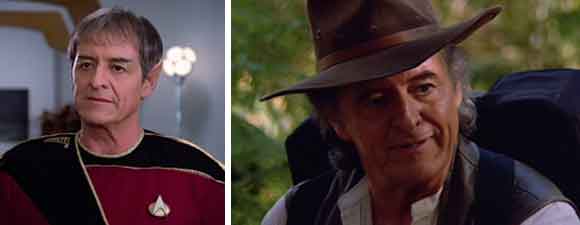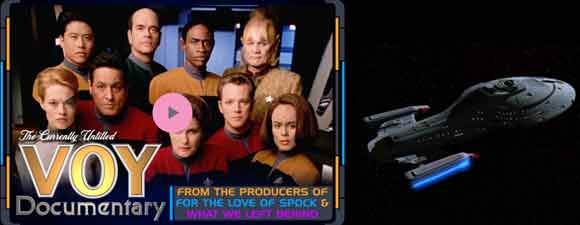Retro Review: Fair Trade
7 min read
fairtradebanner
Panicked that his usefulness to Voyager has come to an end, Neelix trades stolen goods for a map to upcoming star systems.
Plot Summary: Neelix is irritating Tuvok and Torres, trying to make himself useful, when Janeway calls him to the bridge to ask about the region of space that the ship is about to enter. Neelix identifies the purple interstellar dust as the Nekrit Expanse and assures Janeway that he can help navigate the ship through it, but suggests first stopping at a station near the border to obtain supplies and provisions. The station manager, Bahrat, greets the ship cordially but advises the crew that he must approve all trades and is entitled to twenty percent commission on all transactions. Aboard the station, Bahrat warns Janeway that pergium will hard to obtain from any trader. Meanwhile, Neelix runs into an old friend, Wix, to whom he confesses that he doesn’t know anything about the Nekrit Expanse and is desperate to find a map, lest Janeway should decide that he is no longer useful and put him off the ship. Wix, to whom Neelix is beholden for taking responsibility years earlier for a smuggling operation that might have put Neelix in prison – and who is stuck on the station now, in debt to Bahrat – helps Chakotay obtain some items the ship needs. Wix tells Neelix that he can help get both pergium and a map if Neelix will borrow a shuttle so they can deliver medical supplies behind Bahrat’s back. When Wix’s contact, a smuggler, tries to steal the supplies, Wix shoots him, making Neelix realize that the “medicines” are narcotics and that he is now complicit in a murder. While Neelix tries to steal warp plasma to keep Wix’s contacts from threatening them both, Bahrat discovers that Chakotay and Paris had met the smuggler and arrest them for murder. Desperate to free his crewmates while hiding his own activities from Janeway, Neelix goes to Bahrat, asking for amnesty for himself and Wix in exchange for help shutting down the smuggling ring. The head smuggler is caught, but Neelix is injured by the plasma, and while he recovers on Voyager, Janeway lectures him about honesty and assigns him to scrub deuterium exhaust.
Analysis: There are so many episodes of Voyager I hate in later seasons that “Fair Trade” is no longer in my bottom ten, but it still feels like a bad After-School Special, lecturing about good behavior instead of creating drama. One of the first things taught in every fiction-writing class is to show, not tell, since readers respond more empathetically to action and dialogue over exposition and moralizing. “Fair Trade” offers up some elements not often seen in a Star Trek episode, where it’s rare to see major characters involved in major criminal activity unless they’re undercover for Starfleet Intelligence or something, so it’s a shame we aren’t allowed to develop our own emotional and ethical reactions. Neelix’s initially sympathetic friend gives us a glimpse into Neelix’s own troubled past and the path upon which Neelix might ultimately have found himself. But instead of letting the characters relate to one another the way real people do, the writers have everyone speaking in condescending fables and cliches. Desperate for advice, Neelix tells Paris that he heard Paris had been in trouble in the past, and rather than giving us a window into Paris’s own experiences, which we know only in a general sense from “Caretaker” (a piloting error, a cover-up, several dead officers, a stint in the Maquis), we get the sort of blather adults direct at pre-teens about how lying is bad and can ruin lives. Maybe Paris doesn’t feel comfortable sharing his intimate feelings about those events with Neelix, which is something that could have been explored; maybe Neelix leaves that encounter feeling as if he can’t even trust Tom, in whom he’d hoped to find a fellow former screw-up. The conversation is dropped, telling us precisely nothing new about Paris and giving us no additional insight into Neelix’s dilemma, yet leaving the typical bad feeling that comes from having to listen to preaching about something we already know. Neelix comes off looking pathetic, Paris comes off looking insensitive, and there’s no dramatic payoff, since we as an audience don’t share Neelix’s worry that the crew intends to put him off the ship.
Things get worse when the crew inevitably finds out what Neelix has been up to – and on one of their own shuttlecraft when it would have made so much more sense for Neelix to take his own, less conspicuous Talaxian freighter. Any of several crewmembers could be chosen to speak to Neelix after his scheming has been uncovered – Paris or Chakotay, for instance, whom Neelix saves when he turns himself and Wix in to Bahrat, or Torres, whose temper Neelix has experienced. All of them have pasts as Starfleet outcasts, and each of them offers an opportunity for some emotional interplay about learning from mistakes and being stronger as a team. But it’s Janeway who gets to do the honors, and her scolding makes me cringe. One could argue that she should respond entirely like a military captain and discipline him, since, when he arranges to steal warp plasma, his actions aren’t all that different from Seska’s arranging to steal replicator parts, even if his motives are different and he decides not to go through with it. There’s no getting around the fact that an alien is dead at the hands of a Federation phaser because Neelix let that technology fall into the wrong hands. But given the uniqueness of Voyager’s situation and the fact that Janeway has shown sympathy before to crewmembers who never received Starfleet training like the ex-Maquis singled out for extra attention by Tuvok, she might instead try to learn the secrets Neelix has been keeping from everyone, providing a more natural excuse for him to reflect on his sordid past than his sputterings to Wix about how he doesn’t like being dishonest. If the whole point is to make Neelix realize that he’s an important part of Voyager’s crew, why do the writers have Janeway treat him more like she’s a disappointed mommy than a Starfleet captain? He gets a lecture about how they’re all family, plus some added chores, which might seem more appropriate if we weren’t seeing evidence throughout the episode that no one really thinks of Neelix as family.
If Janeway values loyalty as highly as she claims, she owes it to herself and Neelix both to learn his full story, to find out why Wix commanded his devotion and what made him change. If we can hear a warning echo of Lando Calrissian in Wix’s “I’m working on a trade deal now that should put me right back in the thick of things again” (“I’ve just made a deal that’ll keep the Empire out of here forever”), we can still sympathize with the other Talaxian. Wix went to vermin-infested prison for a year while covering for Neelix! And Neelix apparently has never thought of him since! Janeway speaks to the Talaxians the way Picard speaks to Cadet Wesley Crusher, “The first duty of every Starfleet officer is the truth,” instead of trying to learn what truths are at the core of Neelix, someone she’s known to be an opportunistic braggart and liar since he used her crew to save Kes – who apparently has left him for good by now, yet we never get to see a scene that would give the relationship closure, though supposedly one was written for “Fair Trade.” None of this is the fault of Ethan Phillips or Kate Mulgrew, both of whom provide strong performances given the didactic, awkward dialogue they must spit out – the same goes for Robert Duncan McNeill and guest star James Nardini, though at times I wish the latter emphasized his character’s pathos a little more and his sociopathic rage a little less. Phillips has had to make do for over two seasons at this point with a character who’s only half-written; I wonder whether he himself was given any inkling that Neelix’s past criminal ties went so deep. He manages to convey complexity and warmth whether he’s being used as the comic relief or the non-Federation foil for all the rigid Starfleet officers. I’m all in favor of Voyager maintaining the vocal idealism of the original series, but it would be so much more enjoyable if it happened organically, not in speeches so overblown that they make some of Kirk’s monologues sound restrained. It’s a distraction from the superb production values of an episode like this one, with costumes, makeup, and background visuals that are a credit to the franchise.






